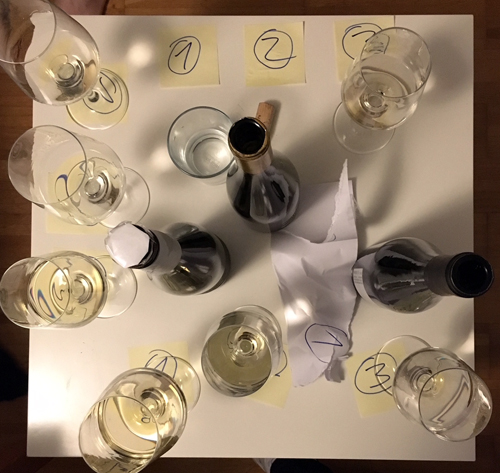Was schön war, Montag, 11. Juni 2018 – „Ithaca“
Bis kurz nach der Mittagszeit getextet; jetzt liefen die Zeilen endlich, die in den letzten Tagen irgendwie störrisch waren und noch nicht so, wie ich sie gerne habe. Fast alles weggearbeitet, was noch in der Pipeline liegt, letzter Text wird hoffentlich heute fertig, und dann habe ich wieder Zeit für die Kunstgeschichte.
Drei Liter Tee getrunken, weil’s lecker war, aber auch, weil es so scheißschwül war, dass nichts anderes ging. Selbst mein Go-to-Getränk – eiskalte Apfelschorle – wollte nicht so recht, zu viel Geblubber. Der Ventilator war im Dauerbetrieb, bis es abends gegen 20 Uhr endlich mal etwas auffrischte. Freue mich jetzt schon auf den Herbst.
—
Der Rest des Tages gehörte zunächst der FAZ, dann dem Internet, dann Masterchef Australia und einer Folge Suits. Und dann nahm ich mir das vorletzte Kapitel im Ulysses vor: Ithaca.
Die Wikipedia behauptet, „Die Handlung wird – mühsam und umständlich – in Form von pseudo-wissenschaftlichen Fragen und Antworten erzählt“, was ich überhaupt nicht so empfunden habe. Frage und Antwort, ja, oder auch gerne mal eine Anweisung: „Compile the budget for 16 June 1904“, worauf eine Liste mit Dingen und Preisen folgt, aber dass das „mühsam und umständlich“ gewesen sein soll, fand ich überhaupt nicht. Ich habe das Kapitel mit großem Genuss gelesen und hätte davon auch gerne noch weitere 50 Seiten gehabt, gerade weil ich es so spannend fand, dass das relativ strenge Format – Frage und Antwort – nie langweilig wurde, ganz im Gegenteil.
Das lag natürlich auch an den Fragen. Manche erforderten eine kurze Antwort, andere brauchten eine Seite. Zum Beispiel, als Bloom sich in der Küche die Hände waschen möchte, bevor er sich und Stephen einen Kakao zubereitet. Die total logische Frage, die uns allen auf der Seele brennt, lautet:
„What in water did Bloom, waterlover, drawer of water, watercarrier returning to the range, admire?“
Und die Antwort, nach der ich das Buch mal eben umarmen und F. eine schwärmische DM schicken musste, weil ich so verliebt in den Text war:
„Its universality: its democratic equality and constancy to its nature in seeking its own level: its vastness in the ocean of Mercator’s projection: its umplumbed profundity in the Sundam trench of the Pacific exceeding 8,000 fathoms: the restlessness of its waves and surface particles visiting in turn all points of its seaboard: the independence of its units: the variability of states of sea: its hydrostatic quiescence in calm: its hydrokinetic turgidity in neap and spring tides: its subsidence after devastation: its sterility in the circumpolar icecaps, arctic and antarctic: its climatic and commercial significance: its preponderance of 3 to 1 over the dry land of the globe: its indisputable hegemony extending in square leagues over all the region below the subequatorial tropic of Capricorn: the multisecular stability of its primeval basin: its luteofulvous bed: Its capacity to dissolve and hold in solution all soluble substances including billions of tons of the most precious metals: its slow erosions of peninsulas and downwardtending promontories: its alluvial deposits: its weight and volume and density: its imperturbability in lagoons and highland tarns: its gradation of colours in the torrid and temperate and frigid zones: its vehicular ramifications in continental lakecontained streams and confluent oceanflowing rivers with their tributaries and transoceanic currents: gulfstream, north and south equatorial courses: its violence in seaquakes, waterspouts, artesian wells, eruptions, torrents, eddies, freshets, spates, groundswells, watersheds, waterpartings, geysers, cataracts, whirlpools, maelstroms, inundations, deluges, cloudbursts: its vast circumterrestrial ahorizontal curve: its secrecy in springs, and latent humidity, revealed by rhabdomantic or hygrometric instruments and exemplified by the hole in the wall at Ashtown gate, saturation of air, distillation of dew: the simplicity of its composition, two constituent parts of hydrogen with one constituent part of oxygen: its healing virtues: its buoyancy in the waters of the Dead Sea: its persevering penetrativeness in runnels, gullies, inadequate dams, leaks on shipboard: its properties for cleansing, quenching thirst and fire, nourishing vegetation: its infallibility as paradigm and paragon: its metamorphoses as vapour, mist, cloud, rain, sleet, snow, hail: its strength in rigid hydrants: its variety of forms in loughs and bays and gulfs and bights and guts and lagoons and atolls and archipelagos and sounds and fjords and minches and tidal estuaries and arms of sea: its solidity in glaciers, icebergs, icefloes: its docility in working hydraulic millwheels, turbines, dynamos, electric power stations, bleachworks, tanneries, scutchmills: its utility in canals, rivers, if navigable, floating and graving docks: its potentiality derivable from harnessed tides or watercourses falling from level to level: its submarine fauna and flora (anacoustic, photophobe) numerically, if not literally, the inhabitants of the globe: its ubiquity as constituting 90% of the human body: the noxiousness of its effluvia in lacustrine marshes, pestilential fens, faded flowerwater, stagnant pools in the waning moon.“
(Zeilen 185–228, Gabler-Edition)
HACH! He, Wallace, THIS is water.
Zwischendurch war ich wie immer im Buch verzückt von schönen Formulierungen, die bei längerem Nachdenken keinen Sinn ergeben, aber schön klingen („with winedark hair“, Zeile 785) oder die schön klingen und viel zu viel Sinn ergeben wie „the ecstasy of catastrophe“, Zeile 786, oder:
„What events might nullify these calculations? [die Altersberechnung von Stephen und Bloom]
The cessation of existence of both or either, the inauguration of a new era or calendar, the annihilation of the world and consequent extermination of the human species, inevitable but impredictable.“ (462–465)
oder
„Alone, what did Bloom feel?
The cold of interstellar space, thousands of degrees below freezing point or the absolute zero of Fahrenheit, Centigrade or Réaumur: the incipient intimations of proximate dawn.“ (1242–1244)
Außerdem stolperte ich wieder über ein Wort, das ich jahrzehntelang mit mir herumgetragen habe, weil ich es in Nik Kershaws The Riddle hörte und danach nie wieder, bevor ich es 2007 im letzten Harry-Potter-Band wiederfand: scullery. Kerhshaw, Rowling, Joyce. Eine illustre Runde. Bitte schickt mir eine Nachricht, wenn ihr irgendwo in einem Buch das Wort scullery lest, ich behaupte, es wird so gut wie nie benutzt.
(Edit: Dass ich schon einige Mails und Tweets bekommen habe, die mich auf unter anderem Robert Frost, Shakespeare, Dorothy Sayers, P. G. Wodehouse, Kazuo Ishiguro, Julian Fellowes oder generell Bücher aus dem 19. Jahrhundert hingewiesen haben, macht mir klar, dass ich mich etwas ungeschickt ausgedrückt habe. Ich war über Harry Potter so erfreut, weil das altmodische Wort in einem neuen Zusammenhang vorkam. Dass die gute alte Waschküche oder die Dame, die in ihr arbeiten musste, in älteren Werken oder in jüngeren, die sich auf eine vergangene Zeit beziehen, vorkommt, hatte ich geahnt. (Dazu zählt natürlich auch Joyce.) Ich nehme aber gerne weitere Hinweise entgegen.)
—
Jetzt muss ich aber los, Penelope wartet.


